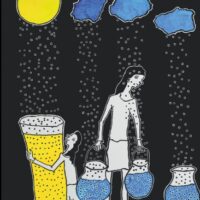Jakup Ferri zooms in to the details of everyday life, shifting our focus away from “big” topics to create an imaginary world inspired by the immediacy of life, both in intimate and collective spaces. The artworks that emerge in various media from paintings to drawings, paper mosaics, embroideries, carpets and videos are vibrant with detail, with the “small” and the common—the places that life explodes, despite the surrounding capitalist destruction and crisis. Humans, creatures and animals catch sunrays and rain drops, play music, dance, perform acrobatics, rest and regenerate. In between the lines, a different world is imagined.
Ferri’s vivid portrayals of city life and leisure connect to folk elements and rituals where the urban space merges with nature, and where humans and animals act as equals, like in cartoons and comics or indigenous and vernacular imagery. The artist highlights the abundant power of everyday human experience as a survival strategy. His work shows the joyful sides of life, even when circumstances take a turn for the worse (as in post-war societies, transition or migration). The witty and humorous messages conveyed sometimes point to the absurd and other times to surreal aspects of life. Representation (of success and wealth) is rendered irrelevant, as animals watch TV, fantastical creatures partake in community festivities, and, generally, when life is a beach. However, these are not frivolous and playful performances of a privileged artist. They are a clear no — a rejection of the state of things.
The artist’s passion for vernacular and home-grown creativity and cultural production is conveyed using two-dimensional aesthetics, minimal drawing and colouring techniques as well as through parallel storytelling. Sources of great inspiration for the research here are early art history and “alternative” art histories taken from avant-gardes, outsiders, folk arts and crafts. Non-western-centric and non-academic knowledge are key here, as they acknowledge the creative capacity of humans independent of their class privilege (which often regulates contemporary art worlds).
Jakup Ferri has also realized art works through closely collaborating with embroidery, tapestry and carpet makers from his hometown Pristina, Kosovo, and from villages in Albania, Suriname and Burkina Faso. Employing this media not only supports grass-root workshops, which are endangered by capitalist modes of production, it also unsettles traditional gender roles (as the medium of textile is often attributed to women based on the patriarchal division of labour). A series of new works in the form of carpets—produced together with his son Jip—have taken his practice into the realm of abstraction, inspired by digital worlds; these are presented alongside his more recent works.
The exhibition at Kunstraum Innsbruck is Jakup Ferri’s first solo show in the “German speaking” area of Europe.
Jakup Ferri (1981, Pristina, Kosovo, based in Pristina and Den Haag) is a contemporary artist and professor at Pristina Art Academy. He studied at Pristina Art Academy and Rijksakademie in Amsterdam. In 2003 he received two prestigious awards in Pristina: the Muslim Mulliqi Prize and the Artists of Tomorrow Award. In 2008 he received the Buning Brongers Award in Amsterdam. He has been an artist-in-residence at numerous places, including the International Studio and Curatorial Program New York, Kultur Kontakt Austria. In addition to private collections, his work is also part of the collection of Ludwig Museum – Museum of Contemporary Art, Budapest. Ferri’s work has been shown extensively at international (solo and group) exhibitions in museums and galleries, festivals and biennials, including Istanbul Biennial, Taipei Biennial, Cetinje Biennale, Kunsthalle Fridericianum; De Appel Amsterdam; The National Gallery of Kosovo, Ljubljana Biennial of Graphic Art, Art Rotterdam, The Centre for Historical Re-enactments, Johannesburg, South Africa, The Horse Hospital, London, De Hallen Haarlem, KW Institute for Contemporary Art Berlin… http://jakupferri.blogspot.com/
Text: Dr.in Ivana Marjanović











